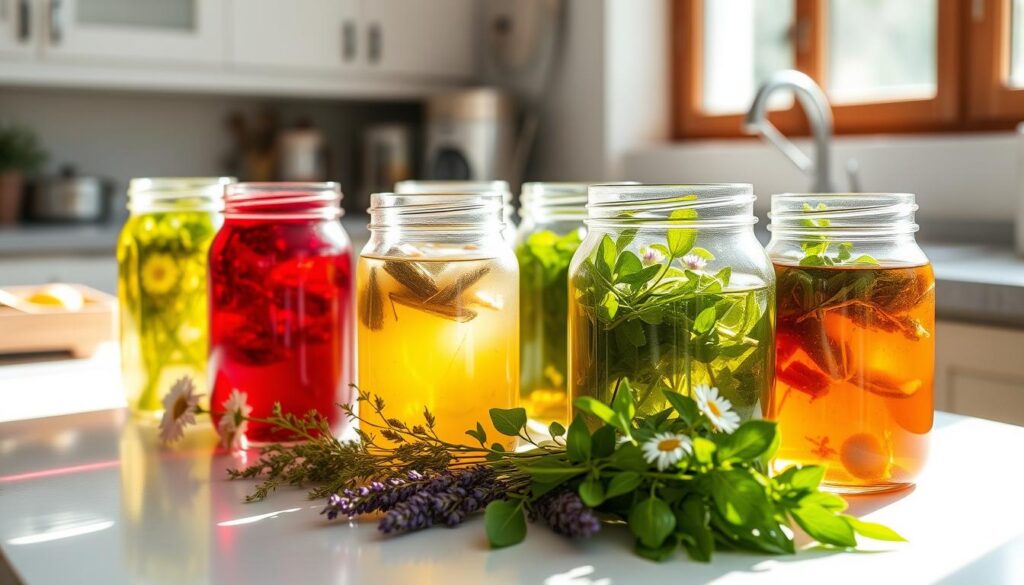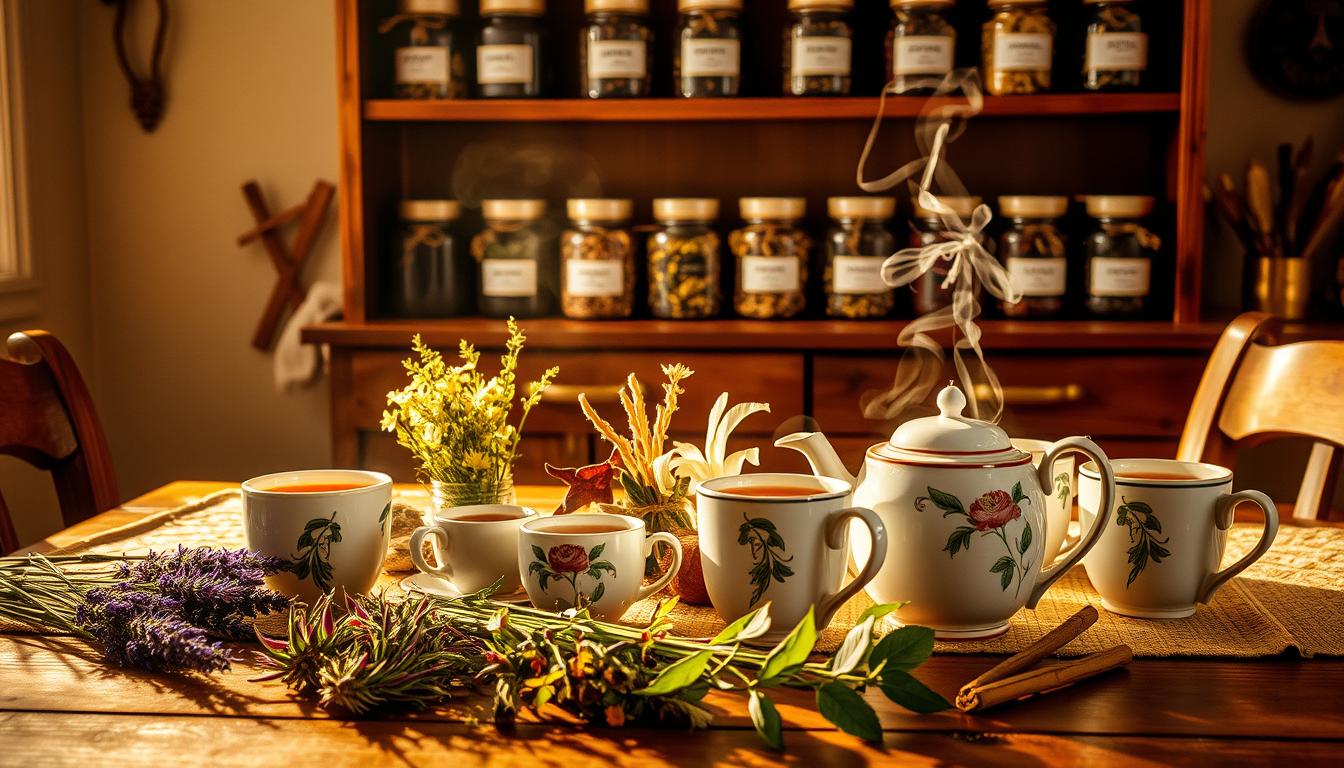Did you know that nearly 80% of adults experience stress or anxiety at some point in their lives? In today’s fast-paced world, maintaining emotional wellbeing is more crucial than ever. One natural and effective way to support emotional health is through the consumption of holistic teas. These teas, derived from various plants and herbs, offer a calming and soothing effect on both body and mind.
Herbal teas have been used for centuries to promote relaxation and reduce anxiety. With a wide variety of teas available, each catering to different emotional needs, individuals can choose the ones that best suit their requirements. From promoting a good night’s sleep to uplifting one’s mood, these teas offer a natural path to achieving emotional wellness.
Key Takeaways
- Holistic teas can significantly reduce stress and anxiety.
- Different herbal teas cater to various emotional needs.
- Naturally promoting relaxation and calmness.
- Aiding in achieving a restful sleep.
- Uplifting mood and overall emotional wellbeing.
The Science Behind Herbal Teas and Emotional Balance
The science behind herbal teas and emotional balance is a fascinating field that combines traditional knowledge with modern research. Herbal teas have been used for centuries to promote emotional wellbeing, and recent studies have shed light on their effectiveness in reducing stress and anxiety.
Herbal teas contain a complex mixture of bioactive compounds that can influence our emotional state. These compounds interact with our brain chemistry, nervous system, and hormonal balance to produce a range of effects.

How Plant Compounds Influence Your Mood
Plant compounds in herbal teas can affect our mood in various ways. For example, flavonoids and phenolic acids have been shown to have a positive impact on mood and cognitive function. These compounds can:
- Modulate neurotransmitter activity, such as serotonin and dopamine
- Reduce inflammation and oxidative stress
- Promote relaxation and reduce anxiety
Some herbal teas, such as chamomile and lavender, are known for their calming effects, while others, like ginseng and rhodiola, are used to boost energy and mental clarity.
Ancient Wisdom Meets Modern Research
The use of herbal teas for emotional wellbeing is rooted in ancient traditions. Modern research has validated many of these traditional uses, providing a deeper understanding of the biochemical mechanisms involved.
“The ancient Greeks and Romans used herbal teas for medicinal purposes, including emotional wellbeing. Modern research has confirmed the efficacy of many of these traditional remedies.”
By combining traditional knowledge with modern research, we can unlock the full potential of herbal teas for natural stress relief and mood-boosting benefits.
Herbal Teas for Emotional Wellbeing: A Complete Guide
Understanding the emotional benefits of herbal teas is crucial for achieving overall wellbeing. Herbal teas have been a cornerstone of natural health practices for centuries, offering a gentle yet effective way to support emotional health.
Identifying Your Emotional Needs
To effectively use herbal teas for emotional wellbeing, it’s essential to identify your current emotional state. Are you experiencing stress, anxiety, or feelings of sadness? Different emotional needs require different herbal approaches. For instance, if you’re struggling with anxiety, you might benefit from anxiety-reducing herbal blends that promote calmness and relaxation.
Reflecting on your emotional needs helps in selecting the most appropriate herbal teas. This personalized approach ensures that you’re using the most effective herbs for your specific emotional challenges.
Selecting the Right Herbs for Your Emotional State
Once you’ve identified your emotional needs, the next step is to choose the right herbs. For relaxation, teas like chamomile and lavender are renowned for their calming effects, making them perfect for relaxation tea blends. If you’re looking to calm the mind with herbal tea, herbs like lemon balm and passionflower can be very effective.
For those experiencing low mood or depression, certain herbs like St. John’s Wort (with consultation from a healthcare provider) and ginseng can offer support. It’s about finding the right balance and combination that works for you.
By understanding your emotional needs and selecting the appropriate herbal teas, you can harness the full potential of these natural remedies to support your emotional wellbeing.
Creating Calming Blends for Anxiety and Stress
Herbal teas offer a natural solution for managing anxiety and stress, and blending them can enhance their benefits. By combining herbs known for their calming properties, you can create personalized tea blends that cater to your specific emotional needs.
How to Blend Chamomile, Lavender, and Linden Flower
Blending chamomile, lavender, and linden flower creates a potent calming tea. Start with equal parts of each herb, then adjust according to your preference. Chamomile is known for its soothing effects, lavender for its calming properties, and linden flower for its ability to reduce anxiety.
- Combine 1 teaspoon of dried chamomile flowers
- Add 1 teaspoon of dried lavender buds
- Mix in 1 teaspoon of dried linden flowers
- Steep in boiling water for 5-7 minutes
Preparing Lemon Balm and Passionflower Infusions
Lemon balm and passionflower are herbs known for their stress-relieving properties. To prepare an infusion, combine equal parts of dried lemon balm and passionflower. This blend not only calms the mind but also uplifts the spirit.
- Mix 2 teaspoons of dried lemon balm with 2 teaspoons of dried passionflower
- Steep the mixture in 2 cups of boiling water for 10 minutes
- Strain and enjoy the infusion hot or iced
Using Holy Basil (Tulsi) for Daily Stress Management
Holy basil (Tulsi) is revered for its adaptogenic properties, helping the body adapt to stress. Drinking Tulsi tea daily can enhance your resilience to stress and promote overall wellbeing.
- Steep 1 teaspoon of dried Tulsi leaves in 1 cup of boiling water
- Drink the tea in the morning to start your day with clarity and focus
- Combine Tulsi with other calming herbs for a more potent effect
By incorporating these herbal blends into your daily routine, you can effectively manage anxiety and stress, promoting a more balanced emotional state.
Crafting Uplifting Teas for Depression and Low Mood
Crafting the right blend of herbal tea can be a powerful tool in managing low mood and depression. By selecting specific herbs known for their mood-enhancing properties, individuals can create personalized teas that support emotional wellbeing.
Herbal teas have been used for centuries to uplift mood and combat symptoms of depression. The art of creating these mood-boosting tea varieties involves understanding the unique benefits of various herbs and how they can be combined to promote emotional wellness through herbal teas.
Brewing Mood-Enhancing St. John’s Wort Tea
St. John’s Wort is a well-known herb for its mood-enhancing properties. To brew St. John’s Wort tea, steep 1 teaspoon of dried flowers in boiling water for 5-10 minutes. It’s essential to consult with a healthcare provider before using St. John’s Wort, especially if you’re taking other medications.
Combining Ginseng and Rhodiola for Energy and Focus
Ginseng and Rhodiola are renowned for their energizing properties. Combining these herbs can create a powerful infusion that enhances energy and focus. To prepare, mix equal parts of Ginseng and Rhodiola roots, then steep 1 teaspoon of the mixture in boiling water for 5-7 minutes.
Making Refreshing Citrus and Mint Infusions for Mental Clarity
Citrus and mint are not only refreshing but also known for their ability to enhance mental clarity. To make a citrus and mint infusion, combine dried citrus peel and mint leaves, then steep in boiling water for 3-5 minutes. This healing herbal infusion can be a delightful way to start the day or provide a mid-day boost.
By incorporating these mood-boosting tea varieties into daily routines, individuals can harness the benefits of herbal teas to support emotional wellbeing and manage symptoms of depression and low mood.
Establishing a Daily Tea Ritual for Emotional Wellness
Establishing a daily tea ritual can be a powerful tool for maintaining emotional wellness. By incorporating herbal teas into your daily routine, you can create a moment of calm and tranquility. This consistent practice can help calm the mind with herbal tea and reduce stress.
Step-by-Step Guide to Proper Brewing Techniques
To get the most out of your tea ritual, it’s essential to brew your tea correctly. Start by selecting high-quality, organic herbs that are free from additives and artificial flavorings. Use fresh, filtered water to bring out the optimal flavor and benefits of the herbs. The ideal brewing time will vary depending on the type of herb you’re using, so be sure to research the recommended steeping time. For example, delicate herbs like chamomile may require a shorter steeping time of 5-7 minutes, while roots like ginger may need 10-15 minutes.
Experiment with different temperatures and steeping times to find what works best for you. Some people prefer their tea hot, while others enjoy it iced. You can also add honey or lemon to enhance the flavor. The key is to create a ritual that feels enjoyable and relaxing to you.
Creating Seasonal Tea Blends for Year-Round Support
To keep your tea ritual interesting and tailored to your emotional needs, consider creating seasonal tea blends. In the spring, you might focus on refreshing, floral blends that incorporate herbs like rose petals and lemon balm. Summer is ideal for fruity and citrusy infusions that can help keep you cool and energized. As autumn approaches, warmer, spicier blends featuring herbs like ginger and cinnamon can be comforting. In the winter, soothing, calming blends with herbs like chamomile and lavender can promote relaxation and restful sleep.
By adapting your tea blends to the changing seasons, you can create a dynamic ritual that supports your emotional health throughout the year. This approach allows you to explore different anxiety-reducing herbal blends and find what works best for you.
Nourishing Emotional Wellbeing with Herbal Teas
Herbal teas offer a natural and effective way to support emotional wellbeing. By incorporating relaxation tea blends into your daily routine, you can promote emotional balance and reduce stress.
The various herbal teas for emotional wellbeing discussed in this article provide a range of benefits, from calming anxiety to uplifting low mood. By understanding your emotional needs and selecting the right herbs, you can create personalized tea blends to support your emotional health.
Embracing emotional wellness through herbal teas is a journey that encourages self-care, mindfulness, and a deeper connection with nature. As you explore the world of herbal teas, you can discover new flavors, aromas, and benefits that nourish both body and mind.
By making herbal teas a part of your daily ritual, you can cultivate a sense of calm, clarity, and emotional resilience. Whether you’re seeking to manage stress, boost your mood, or simply enjoy a moment of peace, herbal teas can be a valuable ally on your path to emotional wellbeing.
